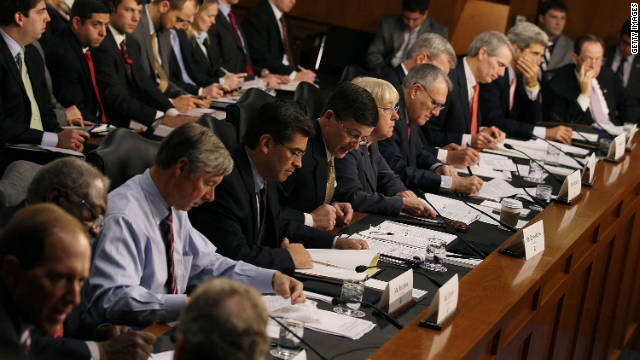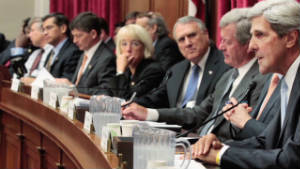Have they gone nuts in Washington?
updated 10:49 AM EST, Mon November 21, 2011

The deficit super committee was asked to find more than a trillion dollars in debt reduction.
STORY HIGHLIGHTS
- David Gergen: Congress' failure to reach debt deal is reckless
- He says leaders in Washington, including president, have failed the people
- At a time of economic crisis, compromise on budget would be a prudent step, he says
- Gergen: Congress and White House are punting on other economic issues
Editor's note: David Gergen is a senior political analyst for CNN and has been an adviser to four presidents. He is a professor of public service and director of the Center for Public Leadership at Harvard University's Kennedy School of Government. Follow him on Twitter: @David_Gergen.
Cambridge, Massachusetts (CNN) -- Have they gone nuts in Washington?Last summer, as the debt ceiling debacle ended, our political leaders held out high hope that a "super committee" would meet for 10 weeks this fall and forge a bipartisan agreement that would do far more to bring down the nation's deficits.
Everyone knew that members of the committee had deep differences.

David Gergen
Democrats say that the rich have increased their wealth much more rapidly than the other 99% of Americans, while their taxes have gone down, so that the first order of business is to raise taxes on them. Both sides have valid points, worthy of debate.
But such contentious disagreements have characterized our politics since the dawn of the republic, and in almost all crises of the past, political leaders have worked out compromises. As Thomas Jefferson put it in 1790, "In general I think it necessary to give as well as take in a government like ours." George Washington agreed and pushed continually for what he called "a spirit of accommodation."
Our "leaders" of today, however, have tossed aside the wisdom of the Founders. The super committee is now hours away from abject failure on what should have been relatively easy work. Some tell us not to worry: A breakdown will automatically trigger "sequestration" -- automatic cuts in defense and domestic programs starting in January 2013. But there are already efforts within Congress to void the sequestration process.
A related concern is how financial markets will react. Some economists tell us not to worry about that, either: They say the markets have long assumed failure and have baked that into their investment decisions. But who knows for sure? Who can tell how a volatile mixture of political failure in Europe and in the U.S. will play out in coming weeks? The truth is nobody knows for sure.
 If super committee fails, what's next?
If super committee fails, what's next? Explain it to me: The 'Super Committee'
Explain it to me: The 'Super Committee'An honest assessment would lay blame on the White House doorstep, too. Yes, the president finally put up a plan a few weeks back and made a few phone calls. But he has been exercising the most passive leadership imaginable. Nor have the Republican candidates for president been any more engaged. Why are their campaigns so focused only on 2013 and so detached from a crisis that continues to deepen in D.C. right now?
It is not as if Congress and the White House are working productively together to solve other problems. They have done almost nothing in recent months to create more jobs and to shore up most homeowners. Hope is not a strategy, as we know, but it seems to be ours right now.
Even as the president promises a larger military presence in the Pacific (how are we going to afford it?), some businessmen are coming home from Shanghai and privately saying China has already won the economic rivalry.
Meanwhile, the White House has played politics with a proposed oil pipeline from Canada. And few raised a peep a few days ago when the chief economist of the International Energy Agency warned, based upon a serious study, that the world would face "irreversible climate change in five years" unless we change course on new energy infrastructure.
Sorry, our noble leaders tell us, we have to focus now on election 2012. What was it that Louis XV used to say? "Après moi, le déluge"?

In the current political environment, a patriot has no chance of getting elected. How many "moderates" are there in either party? They have all been pushed out, and I can guarantee that almost nobody will run for Congress as a moderate (for example, recommending Simpson-Bowles as a basic framework for deficit reduction).
ReplyDeleteI believe we could vote out all the incumbents and we will still have gridlock unless it results in one party having a clear majority in the House, the president, and 60+ reliable votes in the Senate. I think John Kerry is correct that the Republicans believe that, if unemployment stays around 9%, they can take the Senate and the presidency in 2012, so just block the jobs bill, raise payroll taxes next week, etc. and then "write their own deal" in 2013. Agree?
--David
By the numbers: Go to this link and check Table 1.
ReplyDeletehttp://www.cbpp.org/files/10-31-11bud.pdf
--David
No mention of Toomey!
ReplyDeleteKerry might be right but his record for honesty and being straight forward is dubious so I question his veracity.
ReplyDeleteObama spoke and voted against the debt limit increase when he was in the Senate. Now he finds religion and says it must be increased. He has nothing to talk about. He has no credibility.
The Democrats had control of the government for two years but did nothing but increase spending so they cannot now cry that the Republicans are not cooperating.
Obama Care should be eliminated as a starting point but it won't. Instead they are going to gut the military, one of the few things that government SHOULD be doing. Eliminate the rest of the stuff they are not supposed to do and maybe then we could get our country back on a financially stable footing.
They break down the numbers in Toomey's regressive tax proposal here…
ReplyDeletehttp://www.cbpp.org/files/11-18-11tax.pdf
And go here for comparison of Toomey to the Democrats counter-offer….
http://www.cbpp.org/files/11-18-11bud.pdf
As Patty Murray said, and the numbers show, the issue was not that they couldn't get the $1.5 trillion deficit reduction. It was that the Republicans insisted on extending Bush tax cuts as part of any deal. That would add trillions to the national debt as far as the eye can see beyond 2013.
I don't believe Kerry is correct because he was the one who said it. Anybody could have said it. I believe he is correct because it makes sense historically. No president has ever been reelected with unemployment at 9%. The status quo favors Republicans.
The only two good things coming out of this that will help a lot on the deficit are the expiration of the Bush tax cuts (maybe) and the $1.2 trillion spending cuts in the trigger. I love seeing this military spending cut. The U.S. spends more on military than the next 14 countries COMBINED, and most of them are our allies. Ron Paul is the only candidate who makes an sense on military waste.
--David
David, your ideas on the military are very similiar to those of many before we were attacked by Japan in 1941. At that time many did not want to become involved in the "european" war that had already started with Hitler's invasion of Poland. It was "their" war and we did not need to get involved in another european war. Our troops were training with wooden guns since the military had no money to spend to buy guns and ammo.
ReplyDeleteMany of our pilots volunteered and went to England to fly for the RAF. Our planes were of late 1920's vintage and when we got into the war, they were wiped out by the vastly superior German and Japanese.
We may spend more than the "next 14 countries combined" however, we are the ONLY superpower, a role that came to us with the disintegration of the USSR.
If the cuts come into place, as it appears they will, we are invited some country to test us. Now will that come in a year or 5 but it will happen and I for one do not want to get caught flat footed as we did at Pearl. Do you?
David keeps posting things from the Center for Budget and Policy Priorities. From their own website, the following is what they say. It is not a non-partisan think tank. It is liberal and therefore any evaluation makes me skeptical. Isn't it interesting that all of the quotes are from Democrats or left leaning pundits and organizations!
ReplyDeleteWhat Others Say About the Center
“Some months ago, faced with my own philanthropic dilemma, I began informally polling friends, sources and readers to get a sense of which organizations carry weight in both foreign- and domestic-policy negotiations. On domestic policy, the name that kept coming up was the Center on Budget and Policy Priorities. It leans left, but people on both sides admire its empirical rigor, focus on policy and fierce advocacy. It is widely acknowledged as having a voice in both the White House and Congress.”
- Ezra Klein, The Washington Post
“The invaluable Center on Budget and Policy Priorities … [has] been the go-to resource for consistently reliable analysis on matters of budgets and fiscal policy at every level of government.”
- Vice President Biden
“[I]n a political environment rife with ideological warfare and poisoned by partisanship, the Center’s knack for getting things done sets it apart from . . . well, from just about everybody else in Washington.”
- Steven Pearlstein, Pulitzer Prize-winning columnist for the Washington Post
“The Center is one of the nation’s premier policy organizations. Its analysis is used by policymakers and nonprofit organizations across the political spectrum.”
- Independent Sector
“Among the alphabet soup of think tanks and partisan advocacy groups covering tax and budget issues, the CBPP has carved out a niche as being socially liberal, fiscally conservative, and academically rigorous.”
- CQ Today
“[F]or more than 20 years [the Center] has established itself as the premier authority on budgetary issues … because its record for scrupulous accuracy is unblemished and because the Center’s work is as carefully consumed by the government officials it watches as by the activists it serves.”
- Tom Oliphant of the Boston Globe
“[The Center’s] statistical work is absolutely impeccable. If you care about [fiscal issues], check CBPP’s site regularly for updates.”
- New York Times columnist Paul Krugman
“[The Center's] experience — focusing on the production of rigorous, high-quality work that is organized around a commitment to low-income citizens — suggests that it is possible to exhibit both commitment and rigor.”
- Beryl Radin, Beyond Machiavelli: Policy Analysis Comes of Age
I agree with Ezra Klein's statement. The Center "leans left" (and so does Klein, for that matter), but they are not the only source I read. I fact-check them as much as I do you! You can separate their data from their conclusions. The data they present are consistently in agreement with data from CBO, BLS, Zandi, and other economists. So, if you want to dispute their numbers, show me your data.
ReplyDeleteOn the military, we spend more than double China on defense as a percentage of GDP and 6-7 times more than them in absolute dollars. Plus, we are already MILES ahead of them in military force. The idea that cutting our defense budget in half is any thereat to our national security is preposterous in the face of these numbers. Vote Ron Paul.